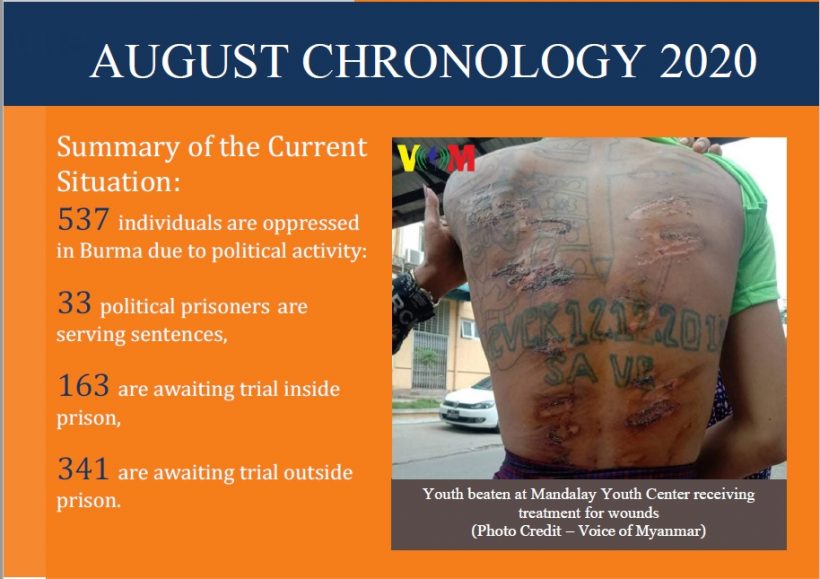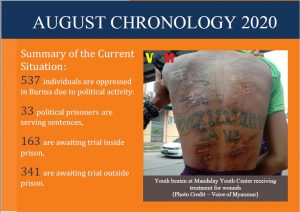AUGUST CHRONOLOGY 2020 and Current Political Prisoners list

Month in Review
8888 Uprising
It was 32 years this month since the 8888 uprising also known as the People’s Democracy Movement began on August 8, 1988. However, Burma is still struggling for democracy, peace and national reconciliation. Moreover, the civil war continues as ethnic issues have not been addressed. Today, activists, students, farmers, workers and civilians still face oppression and restrictions from all sides. In various situations human rights are on the verge of eradication. Accordingly, to fulfill the hope of democracy that began 32 years ago, the key to the reform process is through the protection and promotion of human rights, immediate cooperation with the peace process, amending and repeal oppressive laws, draft and enact laws to promote the rights of citizens, the unconditional release of political prisoners, those who are facing trial inside and outside prisons must be carried out as soon as possible. For these reasons, we urge the government to take immediate action in each sector for the benefit of its people.
This is in contrast to an amendment recently approved by the Union parliament Upper House in July and by the Lower House on August 20 to the 1959 Defence Services Act. The original provision in the act allowed the court martial three years to make a decision, thereafter three years a civilian court is able to make a decision. However this recent amendment takes this power away from the civilian court, after three years no court is allowed to handle the case.
Freedom of Speech and Expression
In August, freedom of speech and expression in Burma has not made any positive steps and it continues to be in a sensitive position. Those exercising these rights face repression in different ways. This month Sein Htwe of the Democracy, Peace and Women (DPW) Group was sentenced to imprisonment under Section 19 of PAPPL and was also charged under Section 20 of PAPPL. Likewise, two Karen youths Sa Thein Zaw Min and Saw Hser Kwar Lar were charged under Section 20 of PAPPL and two civilians Aung Moe Zaw and Kyi Win of Shwegyin Township of Bago Division were charged under Section 19 of PAPPL. Social activist of Arakan State’s Sittwe Town was also charged under Section 66(d) of the Telecommunication Law and Sayadaw U Sein Ti Ta was ordered to testify under Section 500 of the Penal Code and a decision was made to prosecute Sayadaw U Thawbita under Section 66(d) of the Telecommunication Law who played a leading role in the 2007 Saffron Revolution.
By evaluating the above cases, the extent of the freedom of speech and expression of Burma is found to be deteriorating. It is the responsibility of the government to implement improvements to the situation of freedom of speech and expression in the country. Legally, the government must ratify and sign international treaties which guarantee these rights, provisions must be arranged to systematically guarantee this. The government must simultaneously cooperate with civil society organizations (CSOs).
Conditions of Prisons and Cells
Conditions in prisons and cells across Burma have not significantly changed this month. It is especially worrying that the use of torture and other forms of confession and punishment continue to this day. In August, two youths died after all five were beaten after being detained at Mandalay Youth Center having attempted to run away from the center. One of the youths is currently receiving medical treatment. According to police officials, the case was filed as a murder case and five suspetced staffs of the center was arrested and being investigated in relation to the deaths. In addition to this, a man, who was detained at the Myin Ka Kone Police Station in Bogalay Township in Ayeyarwaddy Division, died with injuries over his body in police custody. Tun Shwe of the Division Police Head Quarter said they will investigate police station officials for the death by organizing a district-level tribunal. We welcome the ongoing actions and urge these to be transparent. Torture is a disrespect to human dignity and an abuse of power. Articles 2 and 5 of the Code of Conduct for Law Enforcement Officials state that “law enforcement officials shall respect and protect human dignity and maintain and uphold the human rights of all persons and protect from the torture. Torture affects not only physical and mental health but also reconcilation with the community after release. Measures must be strictly taken to prevent the recurrence of torture in prisons and cells. Moreover, awareness of human rights education, International Covenant on Civil and Political Rights (ICCPR) and United Nations Convention against Torture(UNCAT) must be provided to the relevant officials. Perpetrators must be brought to justice with effective action taken against them.
Deterioration of Civil and Political Rights
These various incidents in August detail the deterioration of civil and political rights across Burma.
- Khin Khin Kyaw, who was sentenced to imprisonment in relation to the Letpadan student protest, had her licence as a high court lawyer removed.
- Former student leader of the All Burma Federation of Student Unions (ABFSU) Aung Thant Zin Oo a.k.a Lin Htet Naing a.k.a James, was sentenced six months imprisonment with hard labour after facing trial for four years. The plaintiff from the Immigration Department did not close the case against him even though the charges filed against all students were closed as soon as the new government took power.
- 15 northern Rakhine villages in Arakan State’s Buthidaung, Kyauktaw, Mrauk-U, Minbya and Ann Townships, voter registration lists are struggling to be posted, due to armed conflicts between the Military and Arakan Army (AA). In addition to this a substantial number of internally displaced people (IDP) living in the Langkhur, Mong Hsat, and Tachileik districts near the Thai border will not get to vote in the November 2020 election.
- Phoe San, an Arakan National Party (ANP) lawmaker who represents Kyaukphyu Township in the state parliament was told by district election officials that we was disqualified from the upcoming election because his estranged son, former Myanmar army major Aung Myint Soe, has joined the Arakan Army (AA).
- A total of five Rohingya candidates from northern Arakan state have been banned from participating in the November 8 election.
Civil rights include ensuring peoples’ physical and mental integrity, life, and safety; protection from discrimination on grounds. Political rights include natural justice (procedural fairness) in law. There is no denying that these rights are restrained in Burma. If a government is able to bring the civil and political rights in a country, it can be described as a democratizing government. As the implementation of the civil and political rights in Burma is the essential process in transition, we urge the government to work for it as soon as possible. Furthermore, we urge the government to ensure that the indigenous peoples living in conflict areas do not lose their right to vote.
For more information:
Assistance Association for Political Prisoners (AAPP)
U Tate Naing (Secretary) +95(0) 9428 023 828
U Bo Kyi (Joint-Secretary) +95(0) 9425 308 840
Download link for PDF August Chronology
Remaining Political Prisoners list Download link 33 Remaining PP list
Facing Trial list 504 Facing Trial List (English) Updated on 31 Aug 20
66 (D) list 66 (D) total list(new) Updated


